八年级上册英语:Unit-7-Will-people-have-robots试题及答案
人教版英语八年级上册Unit 7《Will people have robots》教学设计
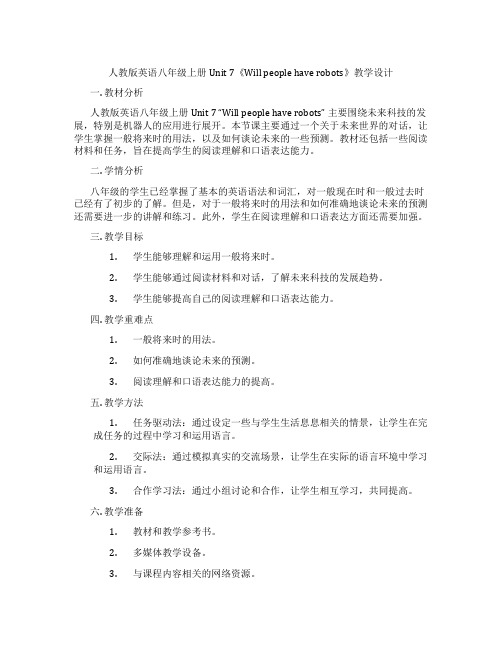
人教版英语八年级上册Unit 7《Will people have robots》教学设计一. 教材分析人教版英语八年级上册Unit 7 “Will people have robots” 主要围绕未来科技的发展,特别是机器人的应用进行展开。
本节课主要通过一个关于未来世界的对话,让学生掌握一般将来时的用法,以及如何谈论未来的一些预测。
教材还包括一些阅读材料和任务,旨在提高学生的阅读理解和口语表达能力。
二. 学情分析八年级的学生已经掌握了基本的英语语法和词汇,对一般现在时和一般过去时已经有了初步的了解。
但是,对于一般将来时的用法和如何准确地谈论未来的预测还需要进一步的讲解和练习。
此外,学生在阅读理解和口语表达方面还需要加强。
三. 教学目标1.学生能够理解和运用一般将来时。
2.学生能够通过阅读材料和对话,了解未来科技的发展趋势。
3.学生能够提高自己的阅读理解和口语表达能力。
四. 教学重难点1.一般将来时的用法。
2.如何准确地谈论未来的预测。
3.阅读理解和口语表达能力的提高。
五. 教学方法1.任务驱动法:通过设定一些与学生生活息息相关的情景,让学生在完成任务的过程中学习和运用语言。
2.交际法:通过模拟真实的交流场景,让学生在实际的语言环境中学习和运用语言。
3.合作学习法:通过小组讨论和合作,让学生相互学习,共同提高。
六. 教学准备1.教材和教学参考书。
2.多媒体教学设备。
3.与课程内容相关的网络资源。
七. 教学过程1.导入(5分钟)通过向学生展示一些机器人的图片,引起学生的兴趣,然后提问:“你们认为未来的人们会拥有机器人吗?”,让学生发表自己的看法。
2.呈现(10分钟)老师通过讲解和示范,向学生介绍一般将来时的用法,并举例说明如何准确地谈论未来的预测。
3.操练(10分钟)学生分组进行角色扮演,模拟真实的交流场景,运用一般将来时进行对话。
老师对学生的表现进行指导和评价。
4.巩固(10分钟)学生阅读教材中的阅读材料,理解并回答相关问题。
八年级英语人教版上册Unit7WillpeoplehaverobotsReading教学设计
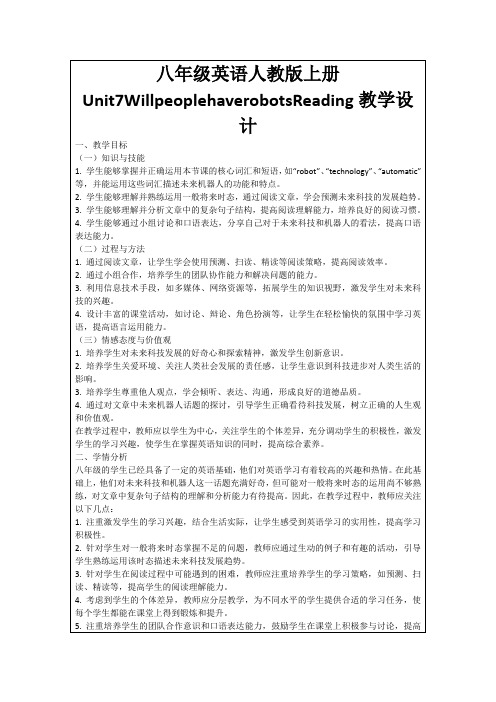
3.学生跟随教师一起阅读文章,了解未来机器人的发展前景,并学习文章中的复杂句子结构。
4.教师针对文章内容进行讲解,帮助学生理解作者对未来科技的观点和态度。
(三)学生小组讨论
1.教师将学生分成小组,让他们讨论以下问题:
a.预测:让学生根据文章标题和图片,预测文章内容。
b.扫读:让学生快速阅读文章,找出关键信息,如未来机器人的功能、优点等。
c.精读:让学生深入阅读文章,分析复杂句子结构,理解作者对未来科技的看法。
4.组织小组讨论,让学生分享自己对于未来科技和机器人的看法,提高口语表达能力,同时培养团队合作意识。
5.设计写作任务,让学生运用所学知识描述自己心中的未来机器人,巩固一般将来时态的运用,并提高写作能力。
6.课堂总结环节,教师引导学生反思本节课的学习内容,强化重点知识,并针对学生的表现给予评价和反馈。
在教学过程中,教师应注意以下事项:
1.关注学生的个体差异,给予每个学生充分的关注和指导,确保他们在课堂上有所收获。
2.创设轻松愉快的课堂氛围,鼓励学生积极参与课堂活动,提高他们的自信心。
3.注重启发式教学,引导学生主动探究,培养他们的创新意识和解决问题的能力。
a. What are the advantages and disadvantages of robots in the future?
b. How will robots change our lives in the future?
2.各小组汇报讨论成果,教师给予评价和指导。
3.教师组织学生进行角色扮演活动,模拟未来生活中与机器人的互动,提高口语表达能力。
人教版八年级上册英语第七课笔记
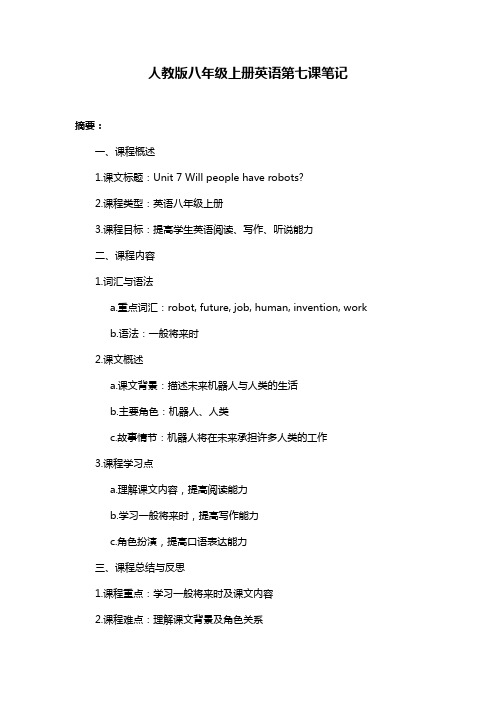
人教版八年级上册英语第七课笔记摘要:一、课程概述1.课文标题:Unit 7 Will people have robots?2.课程类型:英语八年级上册3.课程目标:提高学生英语阅读、写作、听说能力二、课程内容1.词汇与语法a.重点词汇:robot, future, job, human, invention, workb.语法:一般将来时2.课文概述a.课文背景:描述未来机器人与人类的生活b.主要角色:机器人、人类c.故事情节:机器人将在未来承担许多人类的工作3.课程学习点a.理解课文内容,提高阅读能力b.学习一般将来时,提高写作能力c.角色扮演,提高口语表达能力三、课程总结与反思1.课程重点:学习一般将来时及课文内容2.课程难点:理解课文背景及角色关系3.学习建议:多练习口语表达,结合实际生活场景运用所学知识正文:在我国人教版八年级上册的英语课程中,第七课的主题为“Unit 7 Will people have robots?”。
本课程旨在通过阅读、写作、听说等多种方式,帮助学生提高英语能力。
在课程中,首先学习了与主题相关的词汇与语法。
重点词汇包括robot (机器人)、future(未来)、job(工作)、human(人类)、invention(发明)和work(工作)。
语法方面,学生学习了如何使用一般将来时来描述未来的情况。
接下来,通过阅读课文,学生们对课程内容有了更深入的了解。
课文描述了一个未来的场景,在这个场景中,机器人将在各个领域承担许多人类的工作。
人类与机器人的关系成为本课的核心内容。
在学习过程中,学生们通过角色扮演等活动,提高了口语表达能力。
通过理解课文内容,学生们在阅读能力方面也得到了锻炼。
此外,学习一般将来时有助于提高学生的写作能力。
总的来说,本课程为学生提供了一个锻炼英语能力的平台。
在学习过程中,学生不仅需要理解课文内容,还要掌握语法知识和实际运用技能。
八年级英语上册Unit7Willpeoplehaverobots知识点归纳(新版)
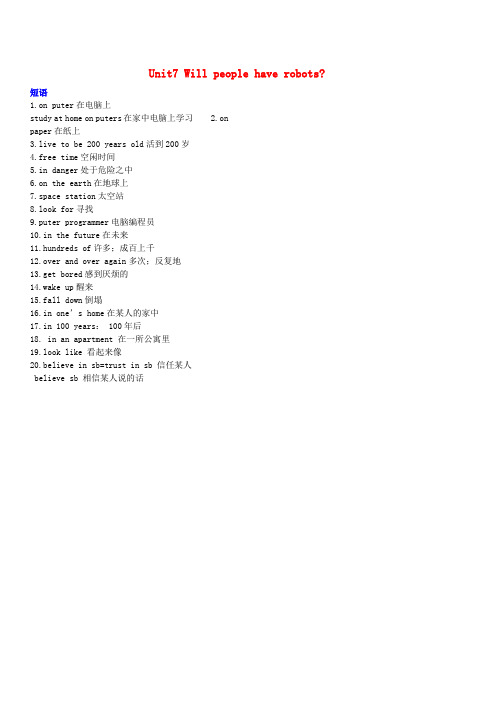
Unit7 Will people have robots?短语1.on puter在电脑上study at home on puters在家中电脑上学习 2.onpaper在纸上3.live to be 200 years old活到200岁4.free time空闲时间5.in danger处于危险之中6.on the earth在地球上7.space station太空站8.look for寻找9.puter programmer电脑编程员10.in the future在未来11.hundreds of许多;成百上千12.over and over again多次;反复地13.get bored感到厌烦的14.wake up醒来15.fall down倒塌16.in one’s home在某人的家中17.in 100 years: 100年后18. in an apartment 在一所公寓里19.look like 看起来像20.believe in sb=trust in sb 信任某人believe sb 相信某人说的话用法:1.will+动词原形将要做……2.fewer/more+可数名词复数更少/更多……less/more+不可数名词更少/更多……3.have to do sth.不得不做某事(客观) must 必须(主观)5.There will be + 主语+其他将会有……6.There is/are +sb./sth.+doing sth.有……正在做某事7.make sb. do sth. 8.help sb. with sth.帮助某人做某事9.What will the future be like ? 未来将会是什么样子?10.Which side do you agree with ?你同意哪一方的观点?。
八年级英语上册Unit7Willpeoplehaverobots全部重要知识点(带答案)

八年级英语上册Unit7Willpeoplehaverobots全部重要知识点单选题1、There ______ an English show this weekend. Shall we go and watch it?A.are going to beB.wasC.will beD.were答案:C句意:这个周末将有一场英语表演。
我们去看好吗?考查there be句型的一般将来时。
根据“There”及“this weekend”可知,此句要用there be句型的一般将来时there is/are going to be或there will be的结构,排除B和D选项。
an English show是单数,be要用is,排除A,故选C。
2、We have decided to sell five things ________ we no longer use.A.thatB.whereC.who答案:A句意“我们已经决定卖5个我们不再用的东西”。
本题考查定语从句。
A.关系代词,指人,在从句中作主语、宾语或表语;B.关系副词,表示地点,在从句中作状语;C.关系代词,指人,在从句中作主语和宾语。
本句话中,先行词为five things,指物,且在从句中作宾语,用that,故选A。
3、—Is Helen here?—No, she isn’t here, She ________ in half an hour.A.arrivesB.arrivedC.will arriveD.has arrived答案:C句意:——Helen在这里吗?——不,她不在,她半个小时后就到了。
考查动词时态。
根据“in half an hour”可知,时间为半个小时后,应用一般将来时;其构成为:will+动词原形。
故选C。
4、---It’s reported that Chinese ___________more than 40 minutes a day reading WeChat(微信).---It’s true. But I think WeChat is taking too much of our time.A.spendB.costC.payD.take答案:A试题分析:句意:——据报道中国人一天花费四十多分钟读微信。
(完整版)八年级上册英语第七单元
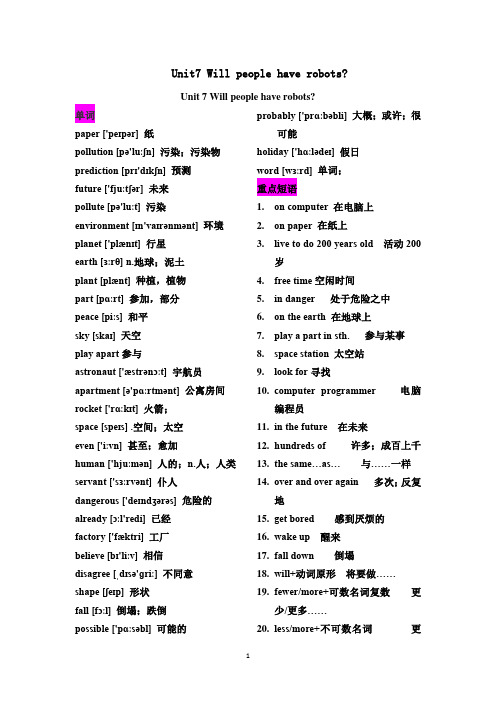
Unit7 Will people have robots? Unit 7 Will people have robots?单词paper ['peɪpər] 纸pollution [pə'luːʃn] 污染;污染物prediction [prɪ'dɪkʃn] 预测future ['fjuːtʃər] 未来pollute [pə'luːt] 污染environment [ɪn'vaɪrənmənt] 环境planet ['plænɪt] 行星earth [ɜːrθ] n.地球;泥土plant [plænt] 种植,植物part [pɑːrt] 参加,部分peace [piːs] 和平sky [skaɪ] 天空play apart参与astronaut ['æstrənɔːt] 宇航员apartment [ə'pɑːrtmənt] 公寓房间rocket ['rɑːkɪt] 火箭;space [speɪs] .空间;太空even ['iːvn] 甚至;愈加human ['hjuːmən] 人的;n.人;人类servant ['sɜːrvənt] 仆人dangerous ['deɪndʒərəs] 危险的already [ɔːl'redi] 已经factory ['fæktri] 工厂believe [bɪ'liːv] 相信disagree [ˌdɪsə'ɡriː] 不同意shape [ʃeɪp] 形状fall [fɔːl] 倒塌;跌倒possible ['pɑːsəbl] 可能的probably ['prɑːbəbli] 大概;或许;很可能holiday ['hɑːlədeɪ] 假日word [wɜːrd] 单词;重点短语1.on computer 在电脑上2.on paper 在纸上3.live to do 200 years old 活动200岁4.free time空闲时间5.in danger 处于危险之中6.on the earth 在地球上7.play a part in sth. 参与某事8.space station 太空站9.look for寻找puter programmer 电脑编程员11.in the future 在未来12.hundreds of 许多;成百上千13.the same…as… 与……一样14.over and over again 多次;反复地15.get bored 感到厌烦的16.wake up 醒来17.fall down 倒塌18.will+动词原形将要做……19.fewer/more+可数名词复数更少/更多……20.less/more+不可数名词更少/更多……21.have to do sth.不得不做某事22.agree with sb. 同意某人的意见23.such+名词(词组)如此……24.play a part in doing sth. 参与做某事25.There will be + 主语+其他将会有……26.There is/are +sb./sth.+doing sth.有……正在做某事27.make sb. do sth. help sb.with sth. 帮助某人做某事28.try to do sth. 尽力做某事29.It’s+ adj.+for sb. to do sth. 对某人来说,做某事……的。
人教版英语八年级上册Unit7《Will people have robots_》知识点
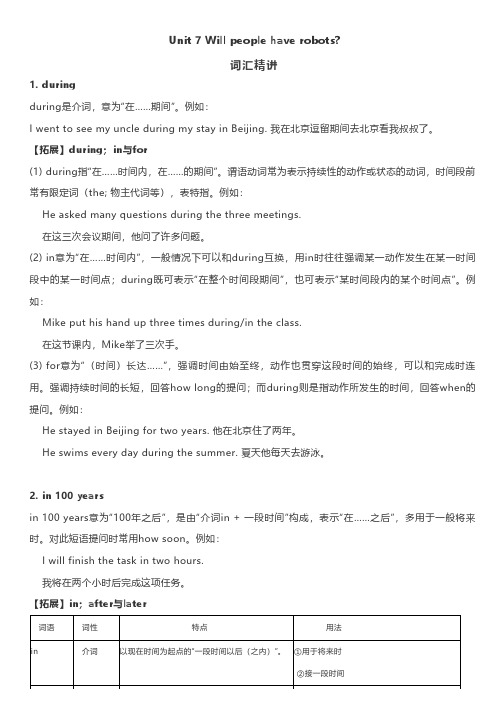
Unit 7 Will people have robots?词汇精讲1. duringduring是介词,意为“在……期间”。
例如:I went to see my uncle during my stay in Beijing. 我在北京逗留期间去北京看我叔叔了。
【拓展】during;in与for(1) during指“在……时间内,在……的期间”。
谓语动词常为表示持续性的动作或状态的动词,时间段前常有限定词(the; 物主代词等),表特指。
例如:He asked many questions during the three meetings.在这三次会议期间,他问了许多问题。
(2) in意为“在……时间内”,一般情况下可以和during互换,用in时往往强调某一动作发生在某一时间段中的某一时间点;during既可表示“在整个时间段期间”,也可表示“某时间段内的某个时间点”。
例如:Mike put his hand up three times during/in the class.在这节课内,Mike举了三次手。
(3) for意为“(时间)长达……”,强调时间由始至终,动作也贯穿这段时间的始终,可以和完成时连用。
强调持续时间的长短,回答how long的提问;而during则是指动作所发生的时间,回答when的提问。
例如:He stayed in Beijing for two years. 他在北京住了两年。
He swims every day during the summer. 夏天他每天去游泳。
2. in 100 yearsin 100 years意为“100年之后”,是由“介词in + 一段时间”构成,表示“在……之后”,多用于一般将来时。
对此短语提问时常用how soon。
例如:I will finish the task in two hours.我将在两个小时后完成这项任务。
八年级英语上册-Unit-7-Will-people-have-robots语法总结-同步写作指导省

short hair
r
University
In 20 years,I__________
robots, swimming
a son,a daughter
第7页
step1审清题目 审题裁:记叙文 审时态:普通未来时 审人称:第一人称 审关键点:1.外貌改变(2分);2.工作改变:职业和工作地 点(4分);3.兴趣改变:机器人和游泳(2分); 4.家庭改变:儿子与女儿(2分)。
第11页
Good_ _morning , everyone.I__am__glad__to__tell__you__something__abou t__the__beautiful__future__of__our__school._
_I__ think__ in__ the__ near_ _future , our__school__will__be__much__more__beautiful__than__ now.Because__we__will__plant__more__trees__and__flow ers__and__water__them__every__day.I__think__it's__im portant__for__us__to__keep__the__school__clean.___ Now,we__have__too__much__homework__to__do__every__da y.We__are__very__tired.I__hope__that__teachers__will __let__us__have__less__homework,so__ we__ will__ have__ more_ _time__ to__ relax__ ourselves.
Unit,7,Will,people,have,robots教案
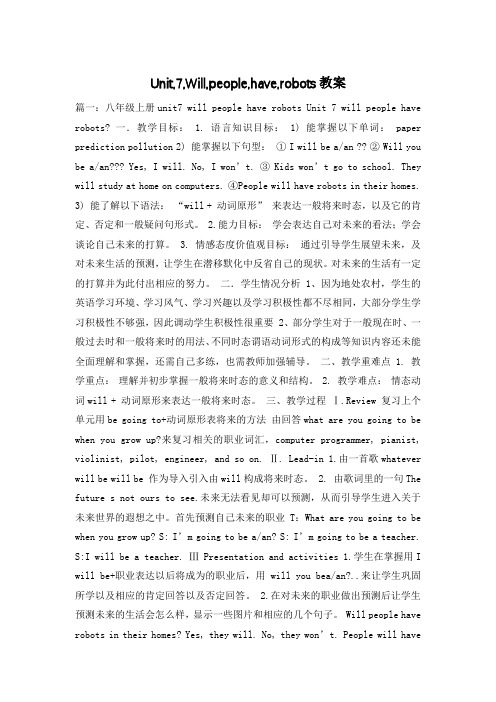
Unit,7,Will,people,have,robots教案篇一:八年级上册unit7 will people have robots Unit 7 will people have robots? 一.教学目标: 1. 语言知识目标: 1) 能掌握以下单词: paper prediction pollution 2) 能掌握以下句型:① I will be a/an ?? ② Will you be a/an??? Yes, I will. No, I won’t. ③ Kids won’t go to school. They will stud y at home on computers. ④People will have robots in their homes.3) 能了解以下语法:“will + 动词原形” 来表达一般将来时态,以及它的肯定、否定和一般疑问句形式。
2.能力目标:学会表达自己对未来的看法;学会谈论自己未来的打算。
3. 情感态度价值观目标:通过引导学生展望未来,及对未来生活的预测,让学生在潜移默化中反省自己的现状。
对未来的生活有一定的打算并为此付出相应的努力。
二.学生情况分析 1、因为地处农村,学生的英语学习环境、学习风气、学习兴趣以及学习积极性都不尽相同,大部分学生学习积极性不够强,因此调动学生积极性很重要 2、部分学生对于一般现在时、一般过去时和一般将来时的用法、不同时态谓语动词形式的构成等知识内容还未能全面理解和掌握,还需自己多练,也需教师加强辅导。
二、教学重难点 1. 教学重点:理解并初步掌握一般将来时态的意义和结构。
2. 教学难点:情态动词will + 动词原形来表达一般将来时态。
三、教学过程Ⅰ.Review 复习上个单元用be going to+动词原形表将来的方法由回答what are you going to be when you grow up?来复习相关的职业词汇,computer programmer, pianist, violinist, pilot, engineer, and so on. Ⅱ. Lead-in 1.由一首歌whatever will be will be 作为导入引入由will构成将来时态。
八年级英语上册-Unit-7-Will-people-have-robots-Section-A(1

1.Read the conversations and answer the questions:
1)What will the future be like in the book?
2)What can people do?
2.Explain some new words and main points in the conversation.
2.Play the recording for the Ss to listen and circle the words.
3.Play the recording again to check the answers.
Work on 2b:
1.Let Ss read the sentences below.Explain some main sentences for the Ss.Make sure they know what to do.
(3)be in great danger(4)on the earth
(5)less water(6)playa part
四、教学重点难点
应对措施和思路
教学重点
教学重点:
教学重点:
1)学习掌握一般将来时态的意义和结构。
2) 掌握There be句型的一般将来时态的结构。
(含教法学法、媒体应用等)
教学难点
教学难点:
掌握more/fewer;more/less的用法。
情态动词will + 动词原形来表达一般将来时态。
(同属教学重难点的, 在本栏书写)
be in great danger, move to other planets; play a part;
人教版英语八年级上册Unit7Willpeoplehaverobots?SectionA含答案
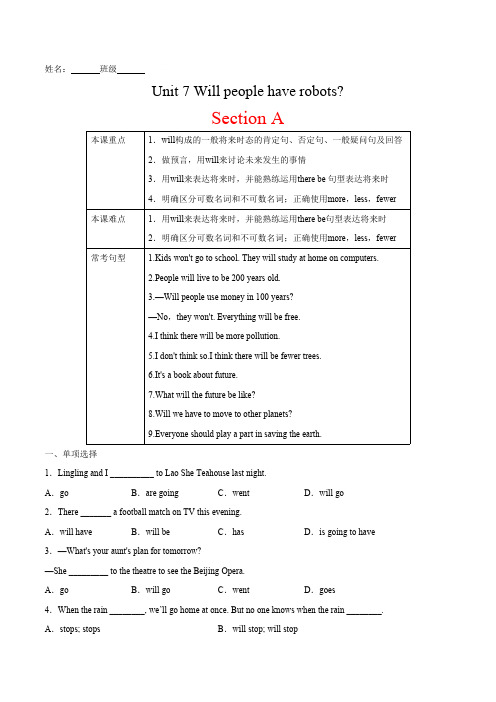
姓名:班级Unit 7 Will people have robots?Section A本课重点1.will构成的一般将来时态的肯定句、否定句、一般疑问句及回答2.做预言,用will来讨论未来发生的事情3.用will来表达将来时,并能熟练运用there be 句型表达将来时4.明确区分可数名词和不可数名词;正确使用more,less,fewer 本课难点1.用will来表达将来时,并能熟练运用there be句型表达将来时2.明确区分可数名词和不可数名词;正确使用more,less,fewer 常考句型 1.Kids won't go to school. They will study at home on computers.2.People will live to be 200 years old.3.—Will people use money in 100 years?—No,they won't. Everything will be free.4.I think there will be more pollution.5.I don't think so.I think there will be fewer trees.6.It's a book about future.7.What will the future be like?8.Will we have to move to other planets?9.Everyone should play a part in saving the earth.一、单项选择1.Lingling and I __________ to Lao She Teahouse last night.A.go B.are going C.went D.will go2.There _______ a football match on TV this evening.A.will have B.will be C.has D.is going to have 3.—What's your aunt's plan for tomorrow?—She _________ to the theatre to see the Beijing Opera.A.go B.will go C.went D.goes4.When the rain ________, we’ll go home at once. But no one knows when the rain ________. A.stops; stops B.will stop; will stopC.stops; will stop D.will stop; stops5.If we do nothing to protect giant pandas, there ________ no more giant pandas in the future. A.will have B.will has C.will be D.will be going to have 6.—Will you go to the cinema with me tomorrow?—Sorry, I _____ skating with Tom.A.go B.goes C.went D.will go7.What will the future ________ like?A.is B.are C.am D.be8.— Will there be more schools in 20 years’ time?—________. I think students will study by Internet at home.A.No, there aren’t B.Yes, there are C.No, there won’t D.Yes, there will 9.The air ________ here makes me uncomfortable.A.discussion B.relationship C.pollution D.information 10.——How soon will he come back? ——___________ two days.A.Before B.After C.In D.For二、用所给词的适当形式填空。
八年级英语上册 Unit 7 Will people have robots?(第2课时)说课稿

八年级英语上册 Unit 7 Will people have robots?(第2课时)说课稿一. 教材分析《八年级英语上册》Unit 7 “Will people have robots?” 是人教版新目标英语教材的一个单元。
本单元主要围绕未来科技的发展,特别是机器人在日常生活中的应用进行讲解。
通过本单元的学习,学生可以掌握一般将来时的被动语态,提高自己的听说读写能力,并激发他们对未来科技的想象和思考。
二. 学情分析八年级的学生已经掌握了英语学习的基本语法和词汇,具备一定的听说读写能力。
他们对新科技充满好奇,善于接受新鲜事物,但同时也可能对一些抽象的概念和语言表达感到困惑。
因此,在教学过程中,我们需要关注学生的个体差异,因材施教,激发他们的学习兴趣和积极性。
三. 说教学目标根据《义务教育英语课程标准》和教材内容,本节课的教学目标如下:1.知识目标:学生能够掌握一般将来时的被动语态,理解与未来科技相关的词汇和表达。
2.能力目标:学生能够在真实情境中运用所学知识进行交流,提高听说读写能力。
3.情感目标:激发学生对未来的想象和思考,培养他们对科技发展的积极态度。
四. 说教学重难点1.教学重点:学生能够熟练运用一般将来时的被动语态进行表达。
2.教学难点:学生能够准确理解与未来科技相关的词汇和表达,以及在真实情境中运用所学知识进行交流。
五. 说教学方法与手段本节课采用任务型教学法,结合情境教学法和分组合作学习法,利用多媒体教学手段,激发学生的学习兴趣,提高他们的参与度和积极性。
六. 说教学过程1.导入:通过展示一段关于未来科技的短片,引发学生对未来的想象,激发他们的学习兴趣。
2.呈现:教师通过PPT展示本节课的主要内容,引导学生关注一般将来时的被动语态和与未来科技相关的词汇。
3.操练:学生分组进行角色扮演,运用所学知识进行对话,教师给予指导和反馈。
4.巩固:学生完成一组有关未来科技的练习题,检测他们对知识的掌握程度。
(完整版)八年级上册英语第七单元

Un it7 Will people have robots?Unit 7 Will people have robots?单词paper ['pe?p?r]纸pollution [p?'lu??n]污染;污染物prediction [pr?'d?k?n]预测future['fju?t??r]未来pollute [p?'lu?t]污染environment [?n'va?r?nm?nt]环境plan et ['pl? n?t]行星earth [??r B 地球;泥土pla nt [pl? nt]种植,植物part [p a ?r参加,部分peace [pi?s]和平sky [ska?]天空play apart 参与astro naut ['?str? n??t]宇航员即artment [?'p a ?rtm?n公寓房间rocket ['r a ?火箭;space [spe?s]空间;太空eve n ['i?v n]甚至;愈加human ['hju?m?n]人的;n.人;人类servant ['s??rv?nt]仆人dan gerous ['de? nd??r?s]危险的already [??l'redi]已经factory ['f?ktri]工厂believe [b?'li?v]相信disagree [?d?s?'不ri同意shape [?e?p]形状fall [f??l]倒塌;跌倒possible ['p a ?s?b能的probably ['pr a ?b?l大大概;或许;很可能holiday ['h a ?l?d假日word [w??rd]单词;1. on computer在电脑上2. on paper在纸上3. live to do 200 years old 活动200岁4. free time空闲时间5. in dan ger 处于危险之中6. on the earth在地球上7. play a part in sth. 参与某事8. space statio n 太空站9. look for 寻找10. computer programmer 电脑编程员11. in the future 在未来12. hundreds of 许多;成百上千13. the same …as … 与...... 一样14. over and over again 多次;反复地15. g et bored 感到厌烦的16. w ake up 醒来17. f all dow n 倒塌18. will+动词原形将要做……19. fewer/more+可数名词复数更少/更多……20. less/more+不可数名词更少/更多……21. have to do sth.不得不做某事22. agree with sb. 同意某人的意见23. such+名词(词组)如此....24. play a part in doing sth. 参与做某事25. There will be + 主语+其他将会有……26. There is/are +sb./sth.+doing sth.有……正在做某事27. make sb. do sth. help sb.with sth. 帮助某人做某事28. try to do sth. 尽力做某事29. It 'sa+dj.+for sb. to do sth. 对某人来说,做某事……的。
人教版-英语-八上-7单元 Will people have robots语法讲解
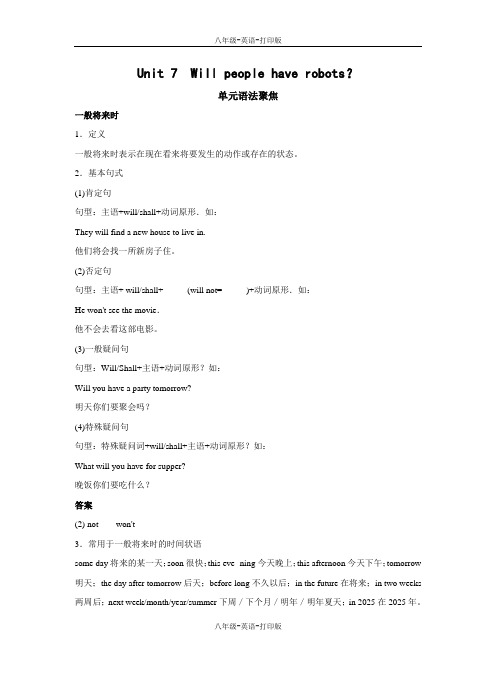
Unit 7 Will people have robots?单元语法聚焦一般将来时1.定义一般将来时表示在现在看来将要发生的动作或存在的状态。
2.基本句式(1)肯定句句型:主语+will/shall+动词原形.如:They will find a new house to live in.他们将会找一所新房子住。
(2)否定句句型:主语+ will/shall+ _____(will not=_____ )+动词原形.如:He won't see the movie.他不会去看这部电影。
(3)一般疑问句句型:Will/Shall+主语+动词原形?如:Will you have a party tomorrow?明天你们要聚会吗?(4)特殊疑问句句型:特殊疑问词+will/shall+主语+动词原形?如:What will you have for supper?晚饭你们要吃什么?答案(2) not won't3.常用于一般将来时的时间状语some day将来的某一天;soon很快;this eve- ning今天晚上;this afternoon今天下午;tomorrow 明天;the day after tomorrow后天;before long不久以后;in the future在将来;in two weeks 两周后;next week/month/year/summer下周/下个月/明年/明年夏天;in 2025在2025年。
4.其他表将来的结构(1)现在进行时态表将来在表示“意图,安排,打算”含义时,可用现在进行时态表示将来。
这样的动词多是表示位移的动词,如go, come, leave, arrive, fly等,或其他非位移动词。
如:He is flying to Beijing tomorrow.他明天飞往北京。
I am visiting my friends.我要拜访我的朋友。
英语人教版八年级上册Unit-7Will-people-have-robots
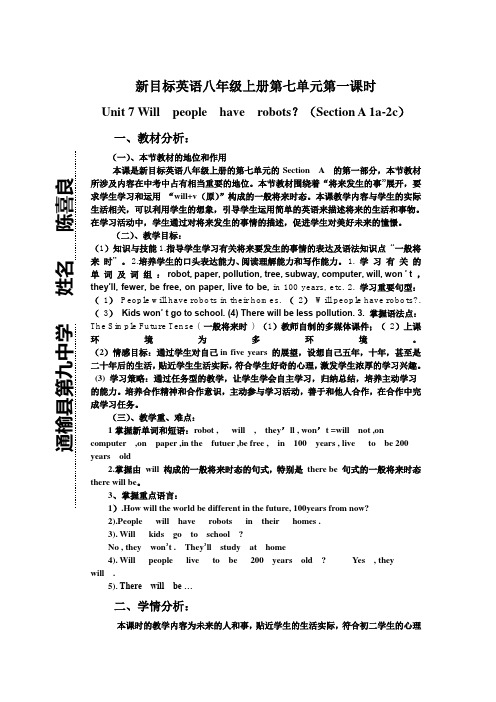
Unit 7 Will people have robots?(Section A 1a-2c)一、教材分析:(一)、本节教材的地位和作用本课是新目标英语八年级上册的第七单元的Section A 的第一部分,本节教材所涉及内容在中考中占有相当重要的地位。
本节教材围绕着“将来发生的事”展开,要求学生学习和运用“will+v(原)”构成的一般将来时态。
本课教学内容与学生的实际生活相关,可以利用学生的想象,引导学生运用简单的英语来描述将来的生活和事物。
在学习活动中,学生通过对将来发生的事情的描述,促进学生对美好未来的憧憬。
(二)、教学目标:(1)知识与技能1.指导学生学习有关将来要发生的事情的表达及语法知识点“一般将来时” 。
2.培养学生的口头表达能力、阅读理解能力和写作能力。
1. 学习有关的单词及词组:robot, paper, pollution, tree, subway, computer, will, won ’ t ,they’ll, fewer, be free, on paper, live to be, in 100 years, etc. 2. 学习重要句型:(1)People will have robots in their homes. (2)Will people have robots?. (3)Kids won’ t go to school. (4) There will be less pollution. 3. 掌握语法点:The Simple Future Tense ( 一般将来时) (1)教师自制的多媒体课件;(2)上课环境为多环境。
(2)情感目标:通过学生对自己in five years 的展望,设想自己五年,十年,甚至是二十年后的生活,贴近学生生活实际,符合学生好奇的心理,激发学生浓厚的学习兴趣。
(3) 学习策略:通过任务型的教学,让学生学会自主学习,归纳总结,培养主动学习的能力。
英语人教版八年级上册Unit-7-Will-people-have-robots
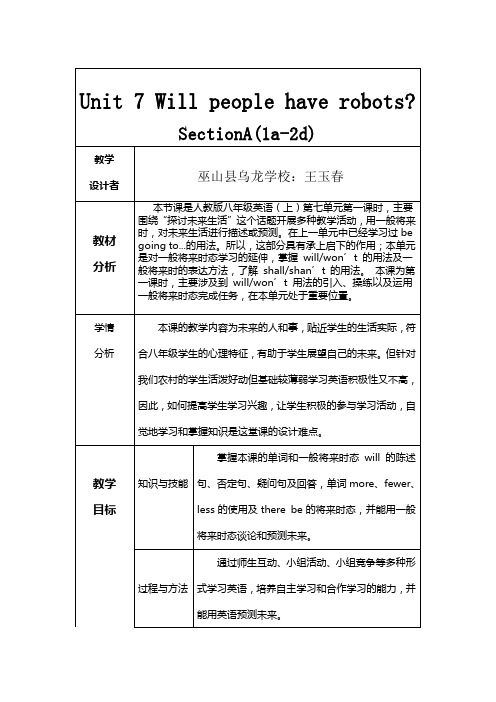
Yes,…will./No,…won’t.
There will/won’t be( more/fewer/less)…
小组评价
教
学
后
记
该教学设计非常贴近学生的生活实际,条理清晰。在引入和课程进行中充分考虑到学生对英语学习感兴趣不浓,运用了许多更直观,更引人入胜的设计,让学生在游戏中巩固新知识,激发学生的学习兴趣使学生乐于学习、乐于探究。在教学过程的设计中充分体现了老师引导,学生自主学习和合作探究学习的观点。设计过程详细但又不受书本内容的局限,把听力归纳在一起来,让学生集中练习。在教学活动中通过预测地球进行德育教育的渗透,增强环保意识。在重点语法教学方面,采用给出实例,让学生归纳总结的方法,不仅教给学生本课的重要语法,同样也交给学生自学的有效方法。
过程与方法
通过师生互动、小组活动、小组竞争等多种形式学习英语,培养自主学习和合作学习的能力,并
能用英语预测未来。
情感态度与价值观
培养合作意识和集体荣誉感,增强环保意识。
教学重点
学习will一般将来时态的构成方式。
单词more、fewer、less的用法,能熟练运用一般将来时态
预测未来。
教学难点
用will一般将来时态表达未来。
Step7.Exercise and homework.
设计理念:复习巩固本堂课所学的知识。
板
书
设
计
Unit 7 Will people have robots? --- Section A
一般将来时:will
1.肯定句:主+will +V(原形)+其他.
2.否定句:主+won’t +V(原形)+其他.
人教版英语八年级上册 Unit 7 Will people have robots教材全解
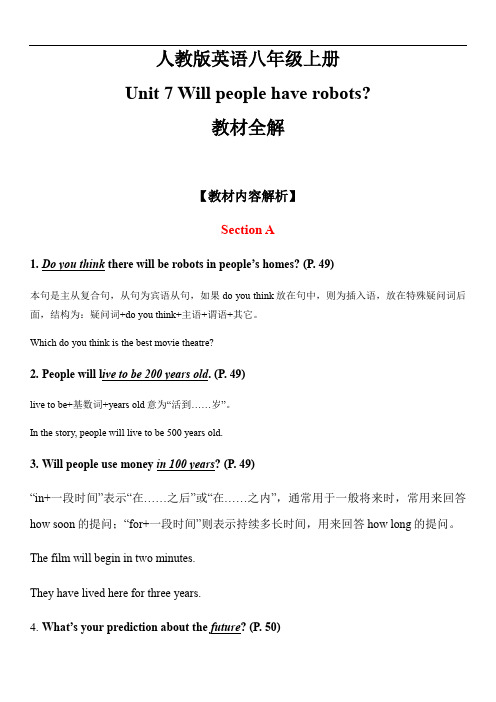
人教版英语八年级上册Unit 7 Will people have robots?教材全解【教材内容解析】Section A1.Do you think there will be robots in people’s homes? (P. 49)本句是主从复合句,从句为宾语从句,如果do you think放在句中,则为插入语,放在特殊疑问词后面,结构为:疑问词+do you think+主语+谓语+其它。
Which do you think is the best movie theatre?2.People will l ive to be 200 years old. (P. 49)live to be+基数词+years old意为“活到……岁”。
In the story, people will live to be 500 years old.3.Will people use money in 100 years? (P. 49)“in+一段时间”表示“在……之后”或“在……之内”,通常用于一般将来时,常用来回答how soon的提问;“for+一段时间”则表示持续多长时间,用来回答how long的提问。
The film will begin in two minutes.They have lived here for three years.4.What’s your prediction about the future?(P. 50)future作名词,表示“将来、未来”,in the future表示“在将来”。
Who knows what will happen in the future.5.I don’t think so.(P. 50)I don’t think so表示“我不这么认为”,肯定形式为I think so。
---Look at the cloud. It is going to rain.---I don’t think so. It will be sunny soon.【拓展】类似的结构还有:I hope so“我希望如此”,I hope not“我希望不是这样”,I’m afraid so“恐怕如此”,I’m afraid not“恐怕不是这样的”。
八年级英语上册《Unit7Willpeoplehaverobots》的知识点归纳
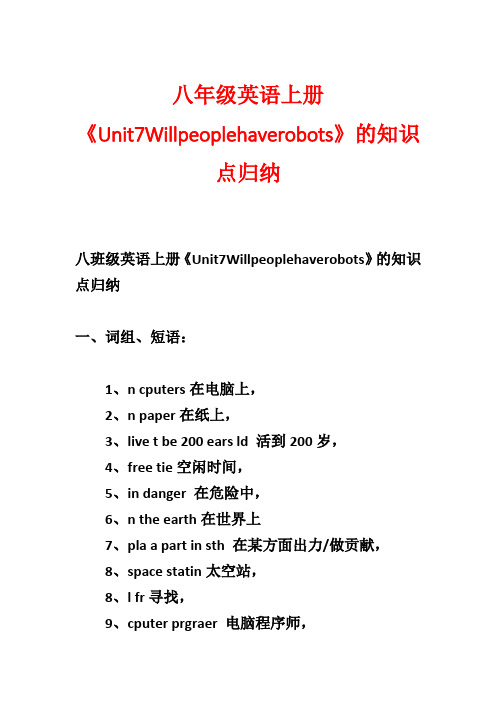
八年级英语上册《Unit7Willpeoplehaverobots》的知识点归纳八班级英语上册《Unit7Willpeoplehaverobots》的知识点归纳一、词组、短语:1、n cputers在电脑上,2、n paper在纸上,3、live t be 200 ears ld 活到200岁,4、free tie空闲时间,5、in danger 在危险中,6、n the earth在世界上7、pla a part in sth 在某方面出力/做贡献,8、space statin太空站,8、l fr寻找,9、cputer prgraer 电脑程序师,10、in the future 在将来,11、hundreds f成百上千的.,12、the sae…as与…一样,13、ver and ver again 反复,14、get bred 无聊,abe/perhaps 用于句首。
Mabe/Perhaps u are right.1. during / fr / in 介词,在……期间。
说到某事是在某一段时间之间发生的用during; 说到某事持续多久则用fr; 说到某事具体发生的时间用in.We visited an places f interest during the suer hlida.I’ve been here fr tw we es.The usuall leave schl in ul.一般将来时结构:肯定式:主语+ will/shall + 动词原形+ 其他will 用于各种人称,shall 用于第一人称。
主语+ be ging t + 动词原形+ 其他be 随人称、数和时间的变化而变换。
否定式:在will/shall/be 后面加nt. will nt = wn’t .一般疑问句:将will/shall/be 提到主语前面。
There be 句型的一般将来时:There will be + 主语+ 其他,意为:将会有。
人教版八年级英语上册Unit7Willpeoplehaverobots单元整体优秀教学案例
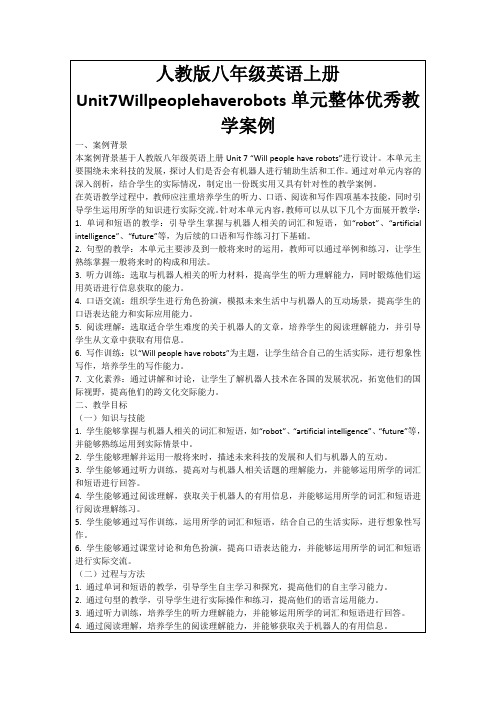
4.通过听力练习,让学生听取与机器人相关的对话或短文,提高他们的听力理解能力和信息获取能力。
(三)学生小组讨论
1.将学生分成小组,每组分配一篇关于机器人的文章,要求学生阅读并讨论文章中的关键信息和观点。
2.引导学生进行角色扮演,模拟未来生活中与机器人的互动场景,鼓励他们运用所学的词汇和短语进行口语表达。
五、案例亮点
1.情境创设:通过引入科幻电影片段和未来科技的发展,引发学生对机器人的好奇心和对未来世界的想象,激发了学生的学习兴趣和探究欲望。这种情境创设不仅与学科和课本内容紧密相关,而且能够激发学生的创造力和思维能力。
2.问题导向:教师提出了与机器人相关的问题,引导学生进行思考和讨论,激发了他们的学习兴趣和批判性思维。通过问题链的形式,引导学生逐步深入探讨机器人的未来发展趋势和影响,培养了学生的问题解决能力。
4.学生能够培养对英语学习的兴趣和热情,提高自己的学习动力和积极性。
5.学生能够通过与他人的合作和交流,培养团队协作能力,并能够理解和尊重他人的观点和意见。
三、教学策略
(一)情景创设
1.利用多媒体展示未来科技的发展和机器人的应用场景,引发学生对未来的想象和思考。
2.设计真实的交流场景,如购物、问路等,让学生在实际情境中运用所学的词汇和短语。
3.小组合作:教师组织了学生进行小组讨论和合作,共同完成任务,培养了他们的团队协作能力和沟通能力。通过小组活动,学生能够互相借鉴和学习,提高了学习效果和综合能力。小组合作的方式也使得每个学生都有机会参与到课堂活动中,提高了他们的主动性和积极性。
4.反思与评价:教师引导学生进行自我反思,总结自己在学习过程中的优点和不足,制定改进措施。通过课堂评价表和学生之间的互相评价,培养学生的评价能力和自我反思能力。这种反思与评价的方式能够帮助学生更好地了解自己的学习状况,激发他们的学习动力和自信心。
八年级英语上册Unit7Willpeoplehaverobots基础知识题库(带答案)
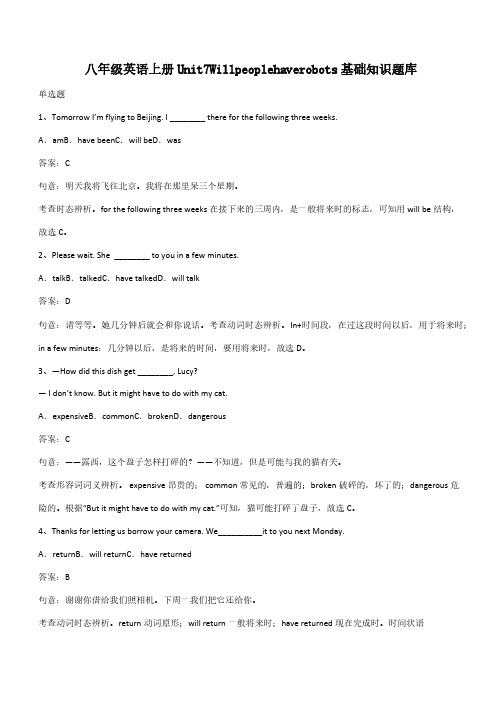
八年级英语上册Unit7Willpeoplehaverobots基础知识题库单选题1、Tomorrow I’m flying to Beijing. I ________ there for the following three weeks.A.amB.have beenC.will beD.was答案:C句意:明天我将飞往北京。
我将在那里呆三个星期。
考查时态辨析。
for the following three weeks在接下来的三周内,是一般将来时的标志,可知用will be结构,故选C。
2、Please wait. She ________ to you in a few minutes.A.talkB.talkedC.have talkedD.will talk答案:D句意:请等等。
她几分钟后就会和你说话。
考查动词时态辨析。
In+时间段,在过这段时间以后,用于将来时;in a few minutes:几分钟以后,是将来的时间,要用将来时,故选D。
3、—How did this dish get ________, Lucy?— I don’t know. But it might have to do with my cat. A.expensiveB.commonC.brokenD.dangerous答案:C句意:——露西,这个盘子怎样打碎的?——不知道,但是可能与我的猫有关。
考查形容词词义辨析。
expensive昂贵的; common常见的,普遍的;broken破碎的,坏了的;dangerous危险的。
根据“But it might have to do with my cat.”可知,猫可能打碎了盘子,故选C。
4、Thanks for letting us borrow your camera. We__________it to you next Monday.A.returnB.will returnC.have returned答案:B句意:谢谢你借给我们照相机。
- 1、下载文档前请自行甄别文档内容的完整性,平台不提供额外的编辑、内容补充、找答案等附加服务。
- 2、"仅部分预览"的文档,不可在线预览部分如存在完整性等问题,可反馈申请退款(可完整预览的文档不适用该条件!)。
- 3、如文档侵犯您的权益,请联系客服反馈,我们会尽快为您处理(人工客服工作时间:9:00-18:30)。
Test for Unit 7听力部分(20分)Ⅰ.听句子,选出与所听内容相符的图片。
(5分)1.______2.______3.______4.______5.______ Ⅱ.听对话,选择正确的答案。
(5分)( )6.What does the man think of the world in the future? A.People won't use money.B.Everything will be more expensive.C.Everything will be cheaper.( )7.What's the man's prediction?A.There will be more pollution.B.There will be more clean water.C.There will be more free time.( )8.What will the man be in the future?A.A teacher.B.A reporter.C.An astronaut. ( )9.What does the man think of being a computer programmer? A.Boring. B.Interesting. C.Difficult.( )10.What did the man see a robot do?A.Watch TV. B.Clean the room.C.Play computer games.Ⅲ.听长对话,选择正确答案。
(5分)听第一段对话,回答第11~12小题。
( )11.What did the man dream that night?A.He flew to the moon. B.He kept a pet.C.He could fly.( )12.What did the man find in his dream?A.Some robots are working like humans.B.A rabbit and a tree. C.A round moon.听第二段对话,回答第13~15小题。
( )13.What's Jill doing?A.He is watching TV about robots.B.He is reading a book about robots.C.He is reading a book about the future.( )14.Where does Jill want to live?A.The earth. B.The moon. C.The other planets.( )15.What should we do to save the earth?A.We will use less money.B.We can use less water and plant more trees.C.We will move to other planets.Ⅳ.听短文,选择正确的答案。
(5分)( )16.People began to use robots about________ago.A.seven hundred years B.several hundred yearsC.seventy years( )17.Modern robots are________old ones.A.smarter than B.as smart as C.not so smart as( )18.We can find________in modern robots' brains.A.clocks B.watches C.computers( )19.There is a robot who can help old people in________.A.London B.Beijing C.Paris( )20.Now robots can do such jobs as________.A.teaching languages B.looking after sick peopleC.cleaning the floor笔试部分(100分)Ⅴ.单项选择。
(15分)( )21.—Joe,what's your prediction ________ the weather?—I think it's going to rain.A.in B.from C.about D.at( )22.—What did you do________your summer holidays,Kelly?—I enjoyed myself in Hawaii.A.of B.during C.inside D.about( )23.I want to be an________like Yang Liwei when I grow up.A.doctor B.engineer C.pianist D.astronaut( )24.It's________for me to get there before 8:00 p.m.The rain is too heavy,and the plane won't take off.A.impossible B.already C.necessary D.unlucky( )25.The doctor asked my father to eat________pears and drink________coffee.A.fewer,less B.fewer,fewerC.less,few D.less,less( )26.You shouldn't________everything you read.You should read and think.A.believe B.decide C.hope D.discuss( )27.Look,Mary!There are________sheep on the farm.A.three hundreds B.hundred ofC.three hundred of D.hundreds of( )28.—What are you doing,Susan?—Oh,I'm________my watch.I can't remember where I put it.A.hoping for B.asking forC.looking for D.waiting for( )29.Everyone should play a part________the earth.A.to save B.saved C.for saving D.in saving( )30.Could you please pass me two ________?A.pieces paper B.piece paperC.pieces of paper D.pieces of papers( )31.You will________take a holiday after the exams.A.can B.could C.be able to D.are able to( )32.—Mike,you________play the piano well if you don't work hard.—I know,Mom.A.don't B.won't C.doesn't D.didn't( )33.I'm sure that there________more trees in our country in the future.A.have B.are C.will have D.will be( )34.—________will your father come back,Tony?—In three days.A.How long B.How soonC.How often D.How many( )35.—Will there be more tall buildings in 50 years?—________.A.No,there isn't B.No,they aren'tC.No,there won't D.No,they won'tⅥ.完形填空。
(10分)During the break(课间),Ken was playing games on his mobile phone(手机).Some __36__were standing around him and talking.“It __37__ that people now can't live without mobile phones.What will the mobile phone be like in the future?” One of them suddenly(突然)__38__.“I think it will be as __39__as paper.And we can charge(充电) it by putting it in the sun,”Andy said first.Kelly __40__with Andy.She said,“Yes,it is really possible.In the future,people may leave the Earth and live on other __41__.It'll be very far,__42__we can still talk on the mobile phone.__43__do you think,Millie?”“Well,I don't know.Maybe it will be able to do __44__everything,”Millie answered.“No matter what it will be like,it will become __45__.”( )36.A.scientists B.classmates C.teachers D.parents( )37.A.seems B.touches C.promises D.expects( )38.A.cared B.laughed C.asked D.shouted( )39.A.white B.thin C.big D.high( )40.A.helped B.talked C.played D.agreed( )41.A.planets B.stations C.countries D.schools( )42.A.so B.if C.but D.though( )43.A.What B.Why C.Where D.When( )44.A.ever B.hardly C.already D.almost( )45.A.good and good B.well and wellC.better and better D.best and bestⅦ.阅读理解。
